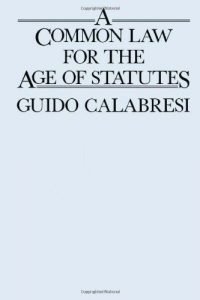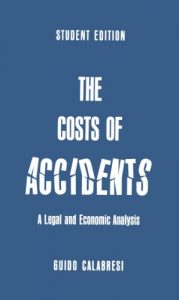The dominance of legislatures and statutory law has put an impossible burden on the courts. Guido Calabresi thinks it is time for this country seriously to consider returning to a traditional American judicial-legislative balance in which courts would enlarge the common law and would also decide when a rule of law has seen its day and should be revised.
Table of Contents:
Reviews of this book:
This is a genuinely original and thoughtful book, one of the few in the jurisprudential genre that is both dearly written and devoid of cliché. It addresses current social and legal issues from an engagingly fresh, nonpolemical, and erudite perspective.
--American Bar Association Journal
Reviews of this book:
Calabresi has brought his ample juristic talents to bear on a foundational problem of the legal and democratic process...in its quality, timeliness and provocativeness [this book] is likely to stand alongside the seminal works of Ronald Dworkin and Grant Gilmore.
--Columbia Law Review
Table of Contents:
1. Choking on Statutes
2. The Flight to the Constitution and to Equal Protection Clauses
3. The Passive Virtues
4. Interpretation
5. The New Deal Response: Administrative Agencies
6. Legislative Responses
7. Structural Responses
8. A New Approach: Antecedents and Roots
9. The Doctrine: A Question of Legitimacy
10. The Doctrine: Limits and Guidelines
11. The Doctrine: Techniques and Feasibility
12. The Role of Courts in an Age of Statutes
13. The Dangers of the Doctrine
14. The Uses and Abuses of Subterfuge
15. The Choice for Candor
Notes
Works Cited
Table of Cases
Index
Reviews of this book:
This is a genuinely original and thoughtful book, one of the few in the jurisprudential genre that is both dearly written and devoid of cliché. It addresses current social and legal issues from an engagingly fresh, nonpolemical, and erudite perspective.
--American Bar Association Journal
Reviews of this book:
Calabresi has brought his ample juristic talents to bear on a foundational problem of the legal and democratic process...in its quality, timeliness and provocativeness [this book] is likely to stand alongside the seminal works of Ronald Dworkin and Grant Gilmore.
--Columbia Law Review








